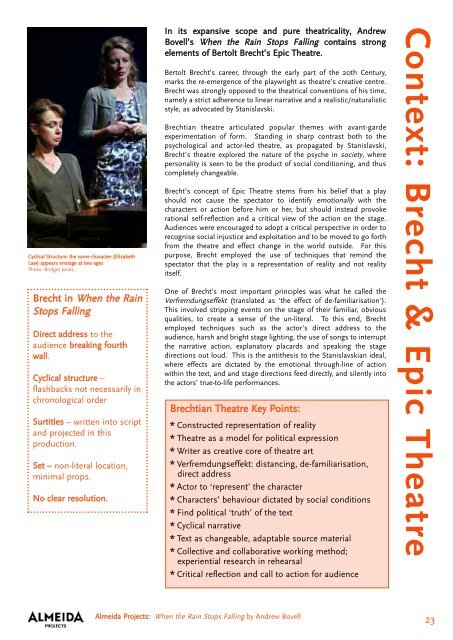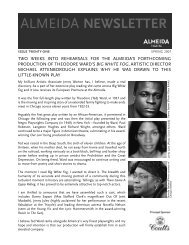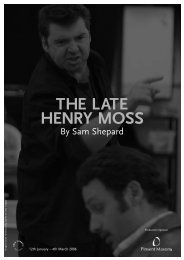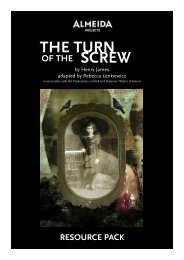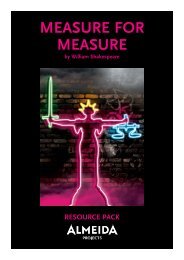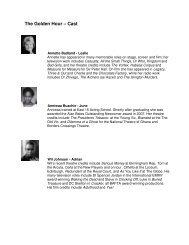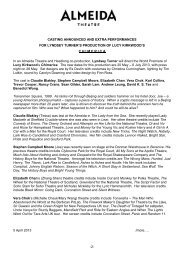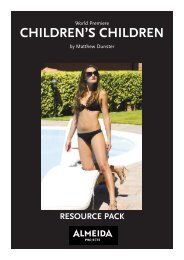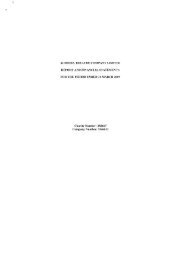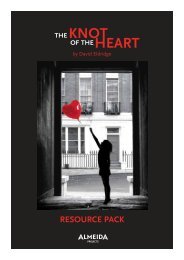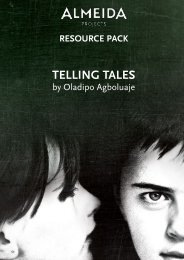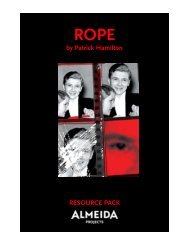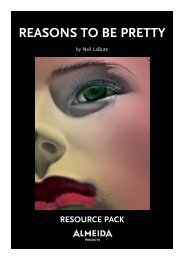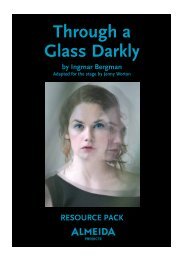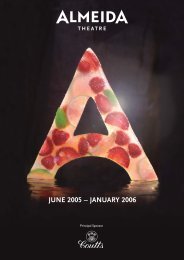When the Rain Stops Falling - Almeida Theatre
When the Rain Stops Falling - Almeida Theatre
When the Rain Stops Falling - Almeida Theatre
You also want an ePaper? Increase the reach of your titles
YUMPU automatically turns print PDFs into web optimized ePapers that Google loves.
Cyclical Structure: <strong>the</strong> same character (ElizabethLaw) appears onstage at two agesPhoto: Bridget JonesBrecht in <strong>When</strong> <strong>the</strong> <strong>Rain</strong><strong>Stops</strong> <strong>Falling</strong>Direct address to <strong>the</strong>audience breaking fourthwall.Cyclical structure –flashbacks not necessarily inchronological orderSurtitles – written into scriptand projected in thisproduction.Set – non-literal location,minimal props.No clear resolution.In its expansive scope and pure <strong>the</strong>atricality, AndrewBovell’s <strong>When</strong> <strong>the</strong> <strong>Rain</strong> <strong>Stops</strong> <strong>Falling</strong> contains strongelements of Bertolt Brecht’s Epic <strong>Theatre</strong>.Bertolt Brecht’s career, through <strong>the</strong> early part of <strong>the</strong> 20th Century,marks <strong>the</strong> re-emergence of <strong>the</strong> playwright as <strong>the</strong>atre’s creative centre.Brecht was strongly opposed to <strong>the</strong> <strong>the</strong>atrical conventions of his time,namely a strict adherence to linear narrative and a realistic/naturalisticstyle, as advocated by Stanislavski.Brechtian <strong>the</strong>atre articulated popular <strong>the</strong>mes with avant-gardeexperimentation of form. Standing in sharp contrast both to <strong>the</strong>psychological and actor-led <strong>the</strong>atre, as propagated by Stanislavski,Brecht’s <strong>the</strong>atre explored <strong>the</strong> nature of <strong>the</strong> psyche in society, wherepersonality is seen to be <strong>the</strong> product of social conditioning, and thuscompletely changeable.Brecht’s concept of Epic <strong>Theatre</strong> stems from his belief that a playshould not cause <strong>the</strong> spectator to identify emotionally with <strong>the</strong>characters or action before him or her, but should instead provokerational self-reflection and a critical view of <strong>the</strong> action on <strong>the</strong> stage.Audiences were encouraged to adopt a critical perspective in order torecognise social injustice and exploitation and to be moved to go forthfrom <strong>the</strong> <strong>the</strong>atre and effect change in <strong>the</strong> world outside. For thispurpose, Brecht employed <strong>the</strong> use of techniques that remind <strong>the</strong>spectator that <strong>the</strong> play is a representation of reality and not realityitself.One of Brecht's most important principles was what he called <strong>the</strong>Verfremdungseffekt (translated as ‘<strong>the</strong> effect of de-familiarisation’).This involved stripping events on <strong>the</strong> stage of <strong>the</strong>ir familiar, obviousqualities, to create a sense of <strong>the</strong> un-literal. To this end, Brechtemployed techniques such as <strong>the</strong> actor's direct address to <strong>the</strong>audience, harsh and bright stage lighting, <strong>the</strong> use of songs to interrupt<strong>the</strong> narrative action, explanatory placards and speaking <strong>the</strong> stagedirections out loud. This is <strong>the</strong> anti<strong>the</strong>sis to <strong>the</strong> Stanislavskian ideal,where effects are dictated by <strong>the</strong> emotional through-line of actionwithin <strong>the</strong> text, and and stage directions feed directly, and silently into<strong>the</strong> actors’ true-to-life performances.Brechtian <strong>Theatre</strong> Key Points:* Constructed representation of reality* <strong>Theatre</strong> as a model for political expression* Writer as creative core of <strong>the</strong>atre art* Verfremdungseffekt: distancing, de-familiarisation,direct address* Actor to ‘represent’ <strong>the</strong> character* Characters’ behaviour dictated by social conditions* Find political ‘truth’ of <strong>the</strong> text* Cyclical narrative* Text as changeable, adaptable source material* Collective and collaborative working method;experiential research in rehearsal* Critical reflection and call to action for audienceContext: Brecht & Epic <strong>Theatre</strong><strong>Almeida</strong> Projects: <strong>When</strong> <strong>the</strong> <strong>Rain</strong> <strong>Stops</strong> <strong>Falling</strong> by Andrew Bovell23


